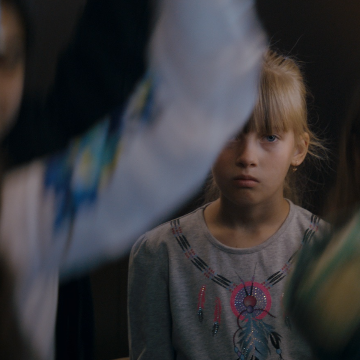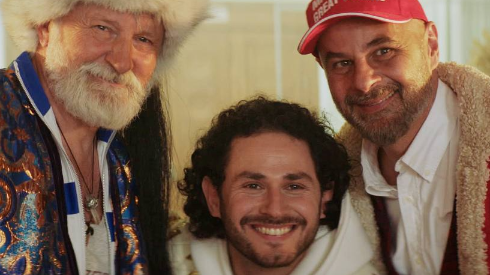
Kateryna Gornostay's New Film TIMESTAMPS Has Been Selected for the Main Competition of the 75th Berlin International Film Festival
Kateryna Gornostay's film A TIMELINE about Ukrainian schools during a full-scale war has been included in the main competition program of the 75th Berlin International Film Festival, which will take place from February 13 to 23, 2025. It is a documentary feature-length film that will compete for the main prize - the Golden Bear. In addition, it is the first film by a Ukrainian director since 1997 to be in the main competition - the last time it was Kira Muratova's film THREE STORIES.
A TIMELINE is a documentary about teachers and students who continue to teach and learn during military operations, including in de-occupied and frontline territories. Shot without voice-overs, interviews, and reconstructions, the film offers an in-depth look at the struggle of the Ukrainian people to preserve education, for their existence and identity. It shows how the war in Ukraine affects the daily lives of students and teachers, and the challenges associated with trying to maintain education and a sense of normal life in conditions of constant danger.
Kateryna Gornostay, the film's director and screenwriter, says about it:
"THE TIME TAPE is an element of a tourniquet: it is important to record the time of applying a hemostatic device so as not to lose the exsanguinated tissues. Now, unfortunately, every schoolchild knows what a tourniquet is and what it is used for, because now they also study it in school. But this is not the main theme of the film. We focused on everyday life and simple school experiences, such as tears at the first bell, a high school student in the role of St. Nicholas, multi-colored ribbons in the hands of graduates. All of this, of course, contains the context of war now: schoolchildren often study in shelters due to anxiety, the principal shows a destroyed and preserved part of the school, while lessons are held in another wing, and at the online graduation, a bell, evacuated from Bakhmut, rings. The war has entered this everyday life very deeply, but we have nothing left but to continue living and learning. And even to look for daily joy, because as one of our heroines says to the students:
— And what is life like? Oh, read it, — she asks the little boy.
— Beautiful, young… — he reads.
— And what is the most valuable thing for each of us? — the teacher addresses the class.
— Life! — the students answer in chorus.
— That's right! We must protect it.
The idea for a film about education during wartime was proposed by the public association OSVITORIA, which acted as executive producer. The film was produced by 2BRAVE PRODUCTIONS.
“When creating this film, we understood that we were appealing to universal, generally understood values. School and education are something that is important for every person in the world. And Kateryna knows how to find a unique approach - how to reflect this deeply and subtly on the big screen. The war changed the lives of Ukrainian educators. It seems that we were able to capture this time marker, this tape,” say Olga Bregman and Natalia Libet, co-founders of 2BRAVE PRODUCTIONS and producers of the film.
The film was co-produced by François Le Gaulle and Marion Guth from the a_BAHN film company (Luxembourg), Rinske Raap from RINKEL DOCS (Amsterdam, the Netherlands) and Victor Ede from CINEPHAGE PRODUCTIONS (Marseille, France).
This is Kateryna Gornostay’s second feature film at the Berlinale. Her feature-length debut STOP-EARTH received the Crystal Bear from the Youth Jury of the Generation 14+ program at the Berlinale in 2021. Kateryna shot her next film TIMELINE with the same team. This is director of photography Oleksandr Roshchin, editor Nikon Romanchenko, sound engineer Mykhailo Zakutsky, producers Olga Bregman (Beskhmelnytsyna) and Natalia Libet, and producer Viktor Shevchenko.
TIMELINE is a unique chronicle of a year from the life of Ukrainian schools, students and teachers from different regions of the country. From Kharkiv and Zaporizhzhia to Kyiv, Chernihiv, Cherkasy, Odessa, Mykolaiv, Ochakov, Kamiansky, as well as towns and villages such as Bucha, Borodyanka, Zarichne.
One of the film’s characters, Borys Khovryak, worked as a teacher during the filming, and today he is defending Ukraine in the ranks of the Land Forces of the Armed Forces of Ukraine, like many other teachers who stood up for the defense of the Motherland.
The film was shot with private funds without involving state funding. According to the idea of the team working on the film, TIMELINE is not only a chronicle of education during the war. It is a story about the strength of the nation, embodied in specific human faces, and a tool of cultural diplomacy.
“We want to remind the world that the war in Ukraine continues, and its children and teachers are paying an excessive price for the opportunity to exercise a basic human right — the right to education. This film should become a means of drawing attention to our struggle. I believe in its powerful potential to evoke empathy and become a platform for dialogue in creative, academic, human rights and political circles,” says Zoya Lytvyn, founder of OSVITORIA and executive producer of the film, about the film TIME STRIP.
The film’s goal is not only to draw attention to the challenges facing Ukrainian education, but also to raise funds to rebuild schools destroyed by the war. During the full-scale invasion of Ukraine, about 3,000 schools were damaged of education, 400 of which were completely destroyed. The funds raised during a large-scale international campaign will allow the schools to be renovated and equipped so that the educational process can continue despite the war.
The international PR for the film will be Claudia Tomassini, who worked on such films as 20 DAYS IN MARIUPOL, directed by Mstislav Chernov, and NO OTHER LAND, directed by Basel Adra and Yuval Abraham.
The 75th Berlinale will be held from February 13 to 23, and this year the head of the jury of the main competition will be director Todd Gaines.

